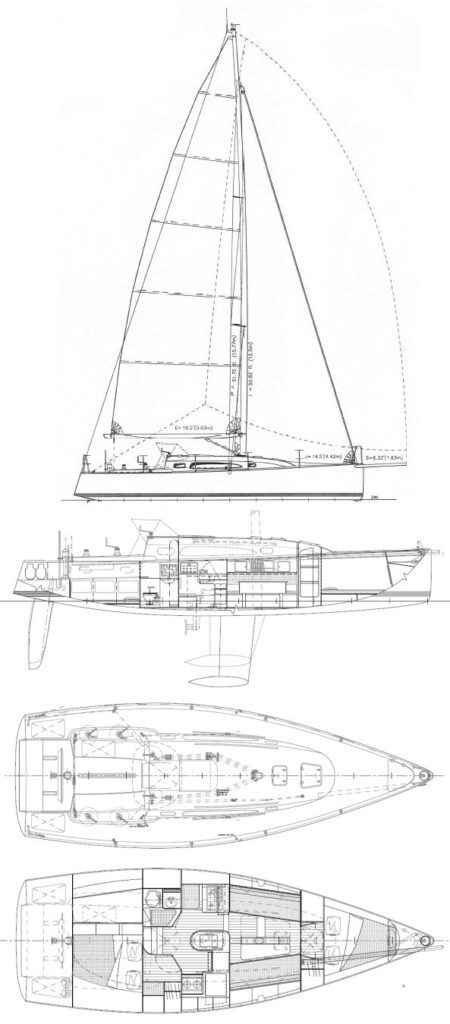The Aerodyne 38, designed by Rodger Martin, is a 38-foot racer/cruiser sailboat that garnered significant recognition, including being named "2000 Sailing World Boat of the Year". Built by Aerodyne Yachts Ltd. in Finland, this model represents the builder's commitment to combining exhilarating sailing performance with comfortable accommodations, appealing to sailors who desire both speed and liveability on the water. With a production run starting in 2000, the Aerodyne 38 quickly established itself as a cornerstone of the Aerodyne line, known for its ability to perform well on the racecourse while offering suitable amenities for cruising.
Aerodyne 38 Information, Review, Specs

- Make
- Model
- Number Built
- 18
- Production Year(s)
- 2000 - ??
The Aerodyne 38 began its production in 2000. The design ethos for the Aerodyne 38, developed by renowned naval architect Rodger Martin, focused on creating a fast, easy-to-sail cruiser/racer with comfortable accommodations. Rodger Martin's broader design philosophy emphasizes creating boats "for sailors," prioritizing accurate and beautiful construction for effective use. The builder, Aerodyne Yachts Ltd., established in 1997 in Hytölä, Finland, has consistently aimed to produce performance-oriented cruising sailboats. Their manufacturing approach during this era emphasized quality construction methods, integrating techniques often seen in one-off custom designs into their production environment. By 1997, eighteen Aerodyne 38s had already been commissioned, highlighting its early success. While there were no significant documented variations like MkI or MkII versions, the boat was offered with a standard draft of 7.75 feet and an optional shallow draft version of 6.0 feet.
Sailing Performance and Handling
The Aerodyne 38 is characterized by a design that prioritizes performance. Its Sail Area to Displacement ratio, calculated at approximately 25.33, indicates a boat that is very responsive in light winds and exhibits strong performance capabilities. With a Ballast to Displacement ratio of about 0.37, the Aerodyne 38 demonstrates good stability, capable of standing up to a fair amount of wind, though it's slightly below the threshold often associated with exceptionally stiff boats. The Displacement to Length ratio, calculated at around 125.5, confirms it as a light, performance-oriented vessel, aligning with the builder's philosophy of efficient hull forms. Anecdotal evidence suggests the Aerodyne 38 exhibits "beautiful manners and steering characteristics," disproving the notion that all race boats are difficult to handle. Its design, featuring "snubbed-off ends," contributes to an effective sailing length, further enhancing its performance. The boat's fractional sloop rig, with an I-dimension of 50.82 feet and a J-dimension of 14.5 feet, along with a mainsail E of 16.5 feet and P of 51.75 feet, provides a powerful and easily managed sail plan.
Accommodations and Layout
While specific details on the Aerodyne 38's interior are not extensively detailed in the provided data, the design brief for the model emphasized comfortable below-deck accommodations. Search results indicate that Rodger Martin's designs, including the Aerodyne 38, typically offer well-thought-out interior spaces for cruising. The interior is generally described as accommodating for a cruiser-racer, balancing the need for comfort with the demands of a performance-oriented vessel. Descriptions often highlight typical arrangements such as a V-berth forward, a main salon, a galley, and a head, designed to provide liveability for extended cruising. The overall finish quality and material use, particularly in Rodger Martin's designs, aim for an aesthetic that complements their functional excellence.
Owner's Perspectives
Owners of the Aerodyne 38 consistently praise its blend of racing capability and cruising comforts, a hallmark of its design. Its recognition as "Sailing World Boat of the Year" in 2000 speaks to its overall success and positive reception. Owners often highlight the boat's solid construction and its ability to deliver an exhilarating sailing experience. The boat is often described as a "performance cruiser designed for the discerning sailor who demands speed," with accessible sail controls for easy handling. While specific common problems were not extensively detailed in general owner reviews, the overall sentiment points to a well-regarded vessel that delivers on its promise of a fast yet comfortable sailing experience.
Measurements
Construction & Hull
- Construction Material
- Other
- Hull Type
- Monohull Sailboat
- Keel Type
- Bulb
- Rudder
- 1x Spade
- Ballast
- 4150 lbs (Lead)
- Displacement
- 11250 lbs
- Water Capacity
- 70 gal
- Fuel Capacity
- 25 gal
Engine
- Engine Make
- Yanmar
- Engine Model
- —
- Engine Type
- —
- Engine HP
- 27
- Engine Count
- 1
- Drive Type
- —
- Fuel Type
- Diesel
Rig & Sails
- Rig Type
- Fractional Sloop
- P (Main Luff)
- 51.75 ft
- E (Main Foot)
- 16.5 ft
- I (Foretriangle Height)
- 50.82 ft
- J (Foretriangle Base)
- 14.5 ft
- Forestay Length (est)
- 52.85 ft
- Main Sail Area
- 426.94 sqft
- Foretriangle Sail Area
- 368.45 sqft
- Total Sail Area (Reported)
- 795 sqft
- Total Sail Area (Calc)
- 795.38 sqft
Dimensions
- LOA
- 37.66 ft
- LWL
- 34.21 ft
- Beam
- 13 ft
- Draft
- 7.75 ft
- Max Headroom
- -
- Air Draft
- -
Calculations
- Hull Speed
- 7.84 kn
- Pounds per Inch Immersion
- 1